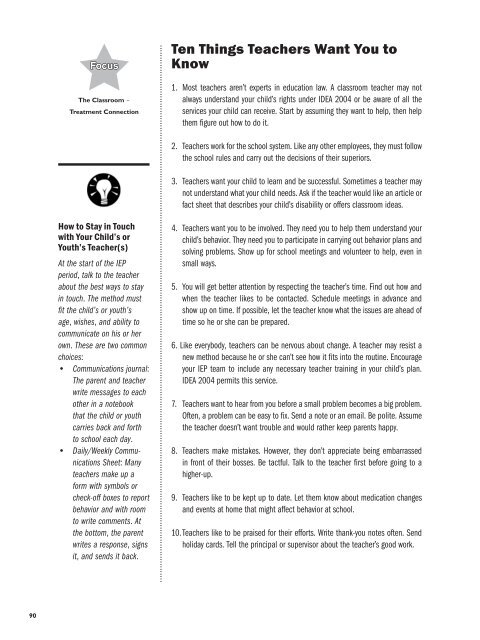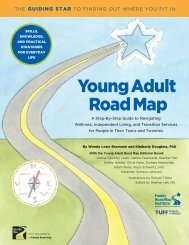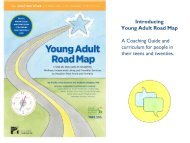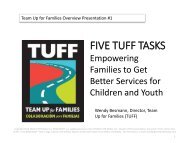Family Road Map Guide
Create successful ePaper yourself
Turn your PDF publications into a flip-book with our unique Google optimized e-Paper software.
Focus<br />
The Classroom –<br />
Treatment Connection<br />
Ten Things Teachers Want You to<br />
Know<br />
1. Most teachers aren’t experts in education law. A classroom teacher may not<br />
always understand your child’s rights under IDEA 2004 or be aware of all the<br />
services your child can receive. Start by assuming they want to help, then help<br />
them figure out how to do it.<br />
2. Teachers work for the school system. Like any other employees, they must follow<br />
the school rules and carry out the decisions of their superiors.<br />
3. Teachers want your child to learn and be successful. Sometimes a teacher may<br />
not understand what your child needs. Ask if the teacher would like an article or<br />
fact sheet that describes your child’s disability or offers classroom ideas.<br />
How to Stay in Touch<br />
with Your Child’s or<br />
Youth’s Teacher(s)<br />
At the start of the IEP<br />
period, talk to the teacher<br />
about the best ways to stay<br />
in touch. The method must<br />
fit the child’s or youth’s<br />
age, wishes, and ability to<br />
communicate on his or her<br />
own. These are two common<br />
choices:<br />
• Communications journal:<br />
The parent and teacher<br />
write messages to each<br />
other in a notebook<br />
that the child or youth<br />
carries back and forth<br />
to school each day.<br />
• Daily/Weekly Communications<br />
Sheet: Many<br />
teachers make up a<br />
form with symbols or<br />
check-off boxes to report<br />
behavior and with room<br />
to write comments. At<br />
the bottom, the parent<br />
writes a response, signs<br />
it, and sends it back.<br />
4. Teachers want you to be involved. They need you to help them understand your<br />
child’s behavior. They need you to participate in carrying out behavior plans and<br />
solving problems. Show up for school meetings and volunteer to help, even in<br />
small ways.<br />
5. You will get better attention by respecting the teacher’s time. Find out how and<br />
when the teacher likes to be contacted. Schedule meetings in advance and<br />
show up on time. If possible, let the teacher know what the issues are ahead of<br />
time so he or she can be prepared.<br />
6. Like everybody, teachers can be nervous about change. A teacher may resist a<br />
new method because he or she can’t see how it fits into the routine. Encourage<br />
your IEP team to include any necessary teacher training in your child’s plan.<br />
IDEA 2004 permits this service.<br />
7. Teachers want to hear from you before a small problem becomes a big problem.<br />
Often, a problem can be easy to fix. Send a note or an email. Be polite. Assume<br />
the teacher doesn’t want trouble and would rather keep parents happy.<br />
8. Teachers make mistakes. However, they don’t appreciate being embarrassed<br />
in front of their bosses. Be tactful. Talk to the teacher first before going to a<br />
higher-up.<br />
9. Teachers like to be kept up to date. Let them know about medication changes<br />
and events at home that might affect behavior at school.<br />
10. Teachers like to be praised for their efforts. Write thank-you notes often. Send<br />
holiday cards. Tell the principal or supervisor about the teacher’s good work.<br />
90














